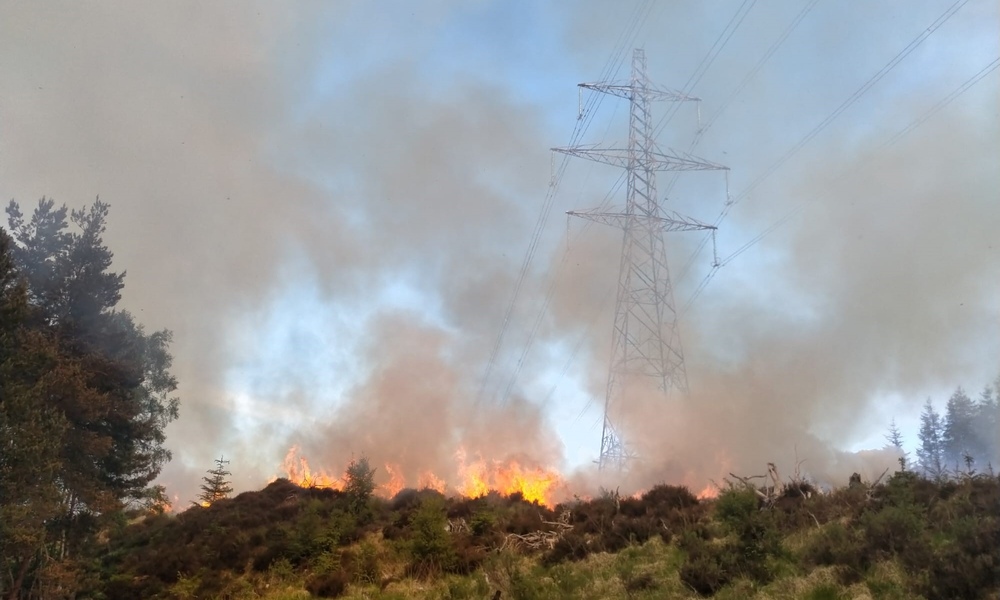Wildfire prevention
The vast majority of wildfires in Scotland are caused - usually accidentally - by people who don't realise just how easy it is for a rogue campfire ember or dropped cigarette to develop into something bigger.
The social and economic impacts of wildfire can be considerable. It can take a large number of firefighters many days to bring a moorland or forest fire under control, reducing their availability to deal with house fires, traffic collisions and other life-threatening situations. This can be even more pronounced in many of the rural areas that we manage where fire crews rely on retained staff from local communities.
In 2023, wildfires burned the equivalent of 534 football pitches of our ground and over 1,400 of ground of our neighbours. The massive fire at Cannich, in addition to damaging large areas of nature-reserve and woodland, cost many hundreds of thousands of pounds to help control and burned for months.
We recommend the following fire safety tips to help prevent a wildfire and ensure you have a safe visit to Scotland's national forests and land:
- If you see a wildfire, please call 999 and ask for the Fire Service
- Follow the Scottish Outdoor Access Code's advice and do not start fires in our woodlands
- Be more careful using stoves and barbeques during prolonged dry periods
- Always fully extinguish cigarettes and dispose of them responsibly
 Cannich fire which burned for months.
Cannich fire which burned for months.
A natural environment for wildfires
Wildfires are generally more likely to start and spread on grassland or moorland in the UK, meaning they can be particularly damaging to open habitats and recreational sites. But Scotland’s forests are among the most productive in Europe, providing an abundance of potential fuel for wildfires.
As well as the potentially negative effect on wildlife habitats, wildfires can burn valuable carbon stores (trees and peatland), releasing greenhouse gases back into the atmosphere. The damage to peatland is of particular environmental concern given the long timeframes it takes to recover. We also manage areas of native Caledonian pinewood and fire damage to these precious remnants would be irreparable.
Fortunately, Scotland's generally cool and wet climate mean wildfires have been relatively rare in our forests and woodlands, so we'll never see anything like those experienced in Australia recently. However, at times we do experience prolonged dry conditions and strong winds that allow fires to establish and spread.
Our prevention work
To get the most benefit out of our forests over the long term, we have to juggle a range of competing values in a complex forest management planning process. An increasingly important element in this is resilience, which means we make use of applicable information - including climate, soils and tree species - to plan forests of the future. Wildfire resilience is one of many aspects of this strategic planning.
Our wildfire management approach
We work closely with the Scottish Fire and Rescue Service (SFRS) to ensure a safe and consistent approach to help tackle wildfires on Scotland’s national forests and land. The health and safety of our staff is of utmost importance and our procedures and guidance reflect this. To further our approach we have created an internal Wildfire Management Group who support, monitor, and regularly review our stance.
The information below outlines the roles and responsibilities of our staff alongside SFRS. We will update this information over time to reflect progress and any changes made by the Wildfire Management Group.
Our staff are not firefighters. However, as our resources allow, we will support SFRS in tackling wildfires that threaten Scotland’s national forests and land.
We will support SFRS in their lead role for fire prevention and suppression through:
- creating annual fire plans that meet the needs of both organisations,
- providing standard procedures for those in wildfire management duties,
- providing extra support to SFRS such as helicopter use, local knowledge, and site access.
We will work with SFRS within their distinct remits. SFRS have specialist staff and equipment for containment of wildfires as well as responsibility for keeping everyone safe.
We will:
- make our staff’s health, safety and wellbeing a priority,
- actively manage our response to wildfires to avoid excessive risks,
- work as a team and support each other,
- take time to assess situations before proceeding,
- take appropriate action to support and liaise with SFRS,
- undertake risk assessments prior to commencing any tasks.
We can’t:
- provide an emergency service,
- actively suppress fires, including damping down,
- expect staff to take on any task that they have not been trained for.
What can you do to help?
All it takes is a little care to prevent a wildfire. Remember our fire safety tips:
- If you see a wildfire, please call 999 and ask for the Fire Service
- Follow the Scottish Outdoor Access Code's advice and do not start fires in our woodlands
- Be more careful using stoves and barbeques during prolonged dry periods
- Always fully extinguish cigarettes and dispose of them responsibly